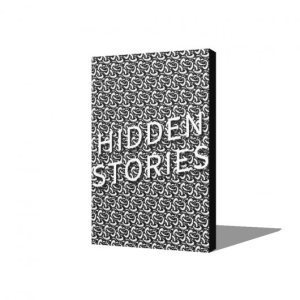Kevan Manwaring's Blog: The Bardic Academic, page 39
April 4, 2015
Kali Exorcism
Check out this awesome apocalyptic video-poem from my friend Helen Moore, Frome-based eco-poet whose new ��collection, Eco-zoic, has just been published.
���Kali Exorcism��� is a collaboration between poet Helen Moore and film-maker Howard Vause.
Inspired by the tradition of exorcism in Beat poetry, this video-poem deploys text, sound and imagery to invoke the purgative energies of Kali so as to cleanse the world of the military-industrial complex and the state of perpetual warfare that the system requires.
The poem ���Kali Exorcism��� features in a new collection, ECOZOA, by Helen Moore published by Permanent Publications (2015). This book offers intimations of a possible future ���Ecozoic Era���, where we live in harmony ���with the Earth as our community���, in stark contrast to the current period of planetary ecosystems ravaged by industrial civilization and war.
Poem: Helen Moore
AV production and animation: Howard Vause
Poem performed by Helen Moore and Howard Vause
Music: Howard Vause feat. PJ Leonard, Emma Harris, Patricia Fewer
Hand dance performed by Karine Butchart

April 2, 2015
Hidden Stories: hiding in plain sight
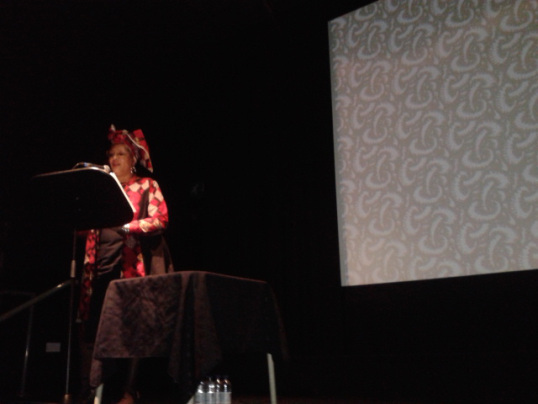 Carol Leeming performing at the Hidden Stories launch, the Phoenix 31 March 2015
Carol Leeming performing at the Hidden Stories launch, the Phoenix 31 March 2015The culmination of a significant multi-media project (Affective Digital Histories: exploring de-industrialised landscapes from the 1970s to the present), Tuesday, 31 March saw the launch of an anthology of the commissioned pieces, Hidden Stories, at the fabulous Phoenix arts centre, in Leicester’s Cultural Quarter – the focus of much of the new writing. I visited it about a year ago to begin my research – and now I was returning as one as the published writers. I felt honoured to have been included in such an excellent collection (which first manifested as the very cool App), to be rubbing shoulders with eight distinctive and accomplished writers. Gathering at the Phoenix on the final day of the project was��Divya Ghelani,��Carol Leeming,��David Devanny, myself,��Pete Kalu and Fereshteh Mozaffari, and��Mark Goodwin and it was in that order that we performed to a full auditorium of over a 100 people. The evening was introduced by Dr Corinne Fowler, who has led this project alongside Dr Ming Lim – both from the University of Leicester. It has been a team effort from beginning to end, and many talented people have been involved – from my supervisor, Harry Whitehead (who suggested the commissions should be in different forms), special collections librarian Simon Dixon, designers Gino and Matteus, who between them crafted the app and the anthology, Sarah Vallance at the Phoenix, who co-ordinated the launch, and of course all the writers. To hear extracts of six of the commissions reinforced their diversity and excellence. These are really high quality pieces – each flourishing within its own format, whether its flash fiction (Divya’s glittering ‘An Imperial Typewriter’), choreopoem (Carol Leeming’s compassionate soul-song for St George’s (‘Love the Life you Live, Live the Life you Love’), play (Pete Kalu and Fereshteh Mozaffari’s ‘5 Glossop Cats’), or poetry (David Devanny’s ‘Crow Steps in the Quarter'; and Mark Goodwin’s ‘Mist’s Rave’) – the latter crafting it into an immersive soundscape and impressive short film which ended the performances in spectacular fashion. Afterwards there was a chance to schmooze, chat to Radio Leicester, pose for photos, slap backs, sign books, but most of all to celebrate our collective achievement. In a quote for the Leicester Mercury I summed up my feelings:��‘I feel delighted to have been part of such a fantastic project – it has been a real cross-fertilization of art forms and disciplines, with talent from near and far. Such a polyphonic expression of voices sends out a strong message of creative excellence through diversity – more important than ever in these troubled times! Thank you to Corinne, Ming, the staff of the Phoenix, and all involved.’
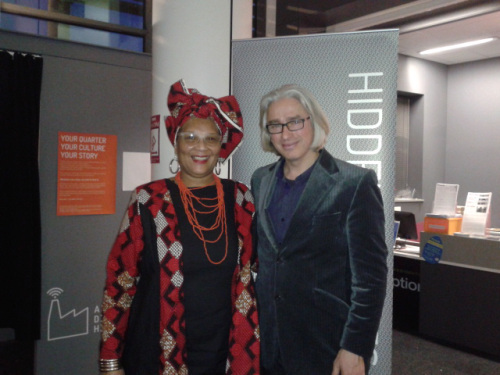 Carol & Kevan at the launch
Carol & Kevan at the launchIt is healthful for a community to hear its stories being told, being celebrated. The narratives of the Cultural Quarter and Glossop show the fascinating, life-affirming weaving of multi-cultural and transparadigmic threads which offers a strong message in these challenging times. Britain is what it is because of its rich rainbow heritage, a blending of many voices, many cultures, many colours, faiths and traditions. Our project, offers in its modestly localized (but non-provincial) way, a microcosm of how bold vision, decent funding, inspiration, ingenuity and skill, can create fruitful collaboration.��Bravo!
 Kevan & Harry at the launch
Kevan & Harry at the launch
Now Available from http://www.phoenix.org.uk/hidden-stories-book/
FFI:��http://affectivedigitalhistories.org.uk/

March 26, 2015
Equinox Bridge
 The Heavens, morning of the solar eclipse and Spring Equinox, Stroud, by Kevan Manwaring
The Heavens, morning of the solar eclipse and Spring Equinox, Stroud, by Kevan ManwaringRising to the brightening fields
to the bridge of day and night
when all is in balance
briefly.
Friends, families, dog-walkers, gather
by the quickening stream
united by their mutual awe.
This morning a kingdom
holds its breath,
the day of the new moon,
the day of the Spring Equinox,
the day of the solar eclipse,
the sun entering Aries,
all the usual astrological mumbo-jumbo.
But the solar system is not our personal orrery.
The show is not for us,
although we act like it is.
No full totality here,
but dramatic enough
for us to stand and stare
astonished,
as the moon takes a bite out of the sun,
Fenris’ rabid bite-marks
raising hackles of primal fear
beyond science and common sense.
Birds quieten, a wind stirs,
pets are bewildered.
Yet we know the light will win in the end.
The moon for once
turns its face away
from the radiance.
A loyal mirror
today is shattered.
Some will turn away from goodness,
some will turn away from the light,
some choose evil’s imagined glamour,
some choose the night.
And yet, in the great scheme of things
(has anyone had a look lately?)
both are needed.
Not a fifty-fifty fixed rigidity
but a flowing, a to-ing and fro-ing.
Like rough-and-tumble cubs fighting.
Towards summer, the lion of sunlight dominates.
Towards winter, a beast cast in night’s bronze.
Both have their place in the Great Dance.
Yet often the light feels frail.
Ah,
so much darkness in the world.
Black-clad barbarians enacting their
impotent rage on aid-workers,
school-children, museum-visitors.
Infantile despots, wanting the world
to comply to their solipsistic
Cyclopean monomania,
their pinhead paradigm,
which perverts its own doctrines
to serve whatever devil lurks inside.
See them nurse their grievance narratives,
polish their Russian rifles,
strap on their home-made bombs,
thinking their lonely library of a single book
can justify destroying all others.
Yet this morning all of that is erased
by the sublime benediction of the new sun,
still shining its endless love on all of its children.
This morning the Earth is like a prayer ���
grass, flower, tree: hands raised in praise.
All that lives, that is truly alive,
turns towards the light.
Only that which denies, which deals in
death, in the destruction of its own past,
a Year Zero moronism, does otherwise.
Yet this morning I stand
one foot in the shade
one foot in the light,
between the Horns and the Heavens
a balancing act, a tight-rope walk,
across the Niagaras of positive and negative
moving stubbornly beyond duality.
Beyond a binary world of
with-us or against-us.
I stand poised on Equinox Bridge
knowing as I cross it
that it disappears behind me as I pass,
that it never truly existed
a fleeting moment, a pulse of awareness,
cherry blossom falling on snow.
And somewhere the future
is surging towards us like the swell of the bore.
And somewhere a king
with a black name is buried,
and somewhere Persiled druids
stand posing in the sun.
All bathed in
eight minute-old light
which scatters its photons
magnanimously across the tilting Earth,
the part we call north,
the place we call home.
In the blink of a blind god’s eye.
Kevan Manwaring
Spring Equinox, 2015

March 15, 2015
Exit Strategies
The great modern fantasy novelist Terry Pratchett (author of the much-loved Discworld novels and many others) died this week (Thursday, 12th March) after a long struggle with a rare form of Alzheimer’s. He campaigned for euthanasia, most memorably in an eloquent and moving 2010 Richard Dimbleby lecture delivered on his behalf by Tony Robinson. (Shaking Hands with Death)
In his final tweet, he departed this Earth with typical wit and nod to the modern (the ‘final tweet': a very modern phenomenon):
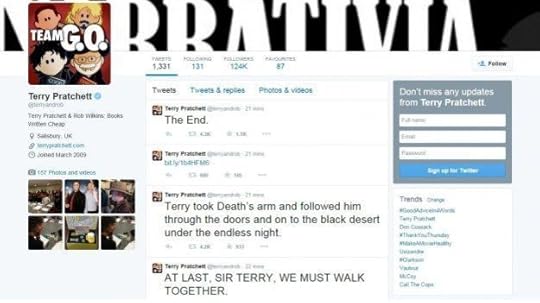
In typical Pratchettian fashion, his fans started a petition soon after – asking Death to let their idol come back. (https://www.change.org/p/death-bring-back-terry-pratchett).
What impressed me about Pratchett’s parthian shot – however sad his premature death at the age of 66 – was the spine-tingling way he seemed to enter his own narrative with those final words (as when the protagonist of Tolkien’s ‘Leaf by Niggle’ entered into his own painting after his death). ��It is the ultimate meta-fictional valediction.
As artists, the hope is that we can ‘live on’ in our art – in Terry’s case, he seems to be suggesting he will live on in his art.
The way we depart – the manner, the timing – is something we can rarely control. People, loved ones, die suddenly all the time. We seldom get a chance to control our exit from this world – though Pratchett and others campaign(ed) for the right to – and yet in Pratchett’s case he was an artist to the end.

Sir Terry Pratchett RIP
While contemplating mortal thoughts, here is a famous literary example of a ‘beautiful death’ from which it is possible to glean wisdom – plucked from the dragon-scorched hoard.
GRAVE GOODS
Beowulf goes into battle alone. All but one of his company have fled ��� but young Wiglaf rallies to his lord’s aid. Together they overcome their adversary, but the price of victory is high. Beowulf is mortally wounded. Dying, he asks Wiglaf to show him the hoard he has won with his life. The champion of the Geats casts his fading gaze upon its gold. He offers loyal Wiglaf reward and dies.
You have completed your major project ��� there it sits: a pile of manuscript pages, perhaps a couple of inches high; or a modest shelf of books. Not much to look at for a life���s work. Yet you should be proud. It is an achievement. Look upon it for a while, and reflect upon all the experience, all the hard work, that has gone into it. Beowulf, mortally wounded, wants to gaze upon the treasure he has paid for with his life���s blood. He says to his loyal retainer, Wiglaf:
���Make haste that my eyes may behold the treasure,
The gleaming jewels, the goodly store,
And, glad of the gold, more peacefully leave
The life and the realm I have ruled so long.���283
Wiglaf quickly obeyed his dying lord���s wish and entered the barrow, where he beheld: ���glittering jewels and gold on the ground���284. It had remained hidden for centuries ��� although much of it remained glorious, glittering in the gloaming, there were also ���many a helmet ancient and rusted.��� The poet observes dolefully: ���Many an arm-ring cunningly wrought,/Treasure and gold, though hid in the ground,/Override a man���s wishes, hide them who will!���285 There are many creative endeavours that sadly remain undiscovered, unappreciated. Unread manuscripts, gathering dust in drawers. Unseen canvases, rolled up. Unheard poems. Unsung songs. Unperformed plays, and unbuilt buildings of exquisite design. Many others, destroyed (as the MSS of Beowulf nearly was) or lost, a museum of What Ifs…? This is the cruel reality of the creative mainstream ��� for every book published, untold thousands will never get that book deal. With digital publishing it is possible to self-publish these days, but the chances of many people reading it are slim ��� with the odd exception that ���goes viral���. So many people are self-publishing that it almost makes it meaningless ��� and the true gems get lost in the crowd, like the real Grail hiding amongst many other chalices, goblets and false cups. Nevertheless, we should always honour our muse and write it ���because we have to���, until the fire in the head peters out, the midnight disease is extinguished ��� like the dragon slain by Beowulf:
���The ancient sword with its edge of iron
Had slain the worm who watched o���er the wealth,
In the midnight flaming, with menace of fire
Protecting the treasure for many a year
Till he died a death.���286
Wiglaf carries out what treasure he could ��� into the cold light of day, bitter with the sea air ��� and showed it to his stricken lord. The sight of it brings a strange satisfaction to his face:
���aged and sad,
Beowulf spoke, as he gazed on the gold.���287
This is what he had fought for, struggled for, journeyed towards ��� for so long. It was his wer-gild, his blood-price ��� his death, waiting for him, in a cold barrow, underground:
���I gave my life for this golden hoard���288Was it truly worth it? Well, Beowulf ��� locked into his warrior culture and his character ��� had little choice it seemed. It had his name ���written on it���. Strangely poignant then, that his wish is to be buried with it ��� it had only just seen the light of day ��� and a ���stately barrow��� raised over him on the headland, visible to all:
���It shall be for remembrance among my people
As it towers high on the Cape of the Whale,
And sailors shall know it was Beowulf���s barrow.��� 289
Is there a sense in which this is a hidden desire of all writers ��� to create a lasting legacy, something that will survive of them into posterity ��� a kind of immortality? And as such, is every such project a rehearsal of death ��� a preparation for ���going away���, an extended suicide note, or ���letter to be read in the event of my death���? With his magnum opus complete, the artist/author may well feel like ���breaking his brushes��� like Steinbeck. His ���antagonist��� ��� that which had defined him ��� lay defeated:
���The monster that slew him, the dreadful dragon,
Likewise lay broken and brought to his death.��� 290
Their respective fates ��� the warrior and the monster ��� are intertwined. The Higher and Lower Self, the Avatarian and Atavistic Impulses, have been reconciled and have cancelled each other out ��� the creative charge has been neutralised, or perhaps consummated in this fierce coupling ��� the ultimate sex magic ��� and now both lay, mortally wounded by this post-coital majeure morte:
���Beowulf bartered his life for the treasure;
Both foes had finished this fleeting life.��� 291
Wiglaf, after reprimanding the ten ���battle-dodgers���, foresees strife and ruin befalling his nation. He arranges for the funeral pyre of Beowulf to be made and piled high with grave goods:
���The Geat folk fashioned a peerless pyre
Hung round with helmets and battle-boards,
With gleaming byrnies as Beowulf bade.��� 292
Once the pyre cooled sufficiently, a barrow is raised over it. No one will wear Beowulf���s treasure ��� no son or wife will continue his line. The warrior-king, in obsessive pursuit of his quest, has left this world alone ��� but not unloved, for his people hold him in high regard, as the magnificence of his barrow attests. The dragon is pitched over the cliff-top into the waves; and the treasures are once more consigned to the soil:
���They bore to the barrow the rings and the gems,
The wealth of the hoard the heroes had plundered.
The olden treasures they gave to the earth.��� 293
So, all must be let go of. We offer up our treasures. The final creative act is often the hardest ��� one of letting go. A project which has possessed us for perhaps years, has become such a huge part of our life ��� must now be forsaken. It can trigger significant grief ��� and leave us feeling empty: a hollow victory. Sometimes, authors do not want to finish their project, do not want to let go. It seemed Tolkien experienced something of the sort ��� with his Middle-Earth becoming his ���precious���. But eventually, we have to drop the One Ring of our magnum opus into Mount Doom ��� it is only healthy. The gold forged in the fires of Mordor, must be melted:
���The precious hoard
Shall burn with the hero. There lies the heap
Of untold treasures so grimly gained,
Jewels and gems he bought with his blood
At the end of his life. All these at the last
The flames shall veil and the brands devour.��� 294This is the hard truth of the creative process. The final phase seems like one of destruction. We must be prepared to cut our ties to it ��� snip that umbilical cord ��� for it to live on, to have a ���life��� of its own. It is in other hands now ��� for them to make of it what they will. Our words are our offering to the ���void��� ��� a message in a bottle. We cast it out into the great unknown ��� wish it well ��� and walk away, perhaps heeding William Blake���s wisdom:
���He who binds to himself a joy
Does the wing��d life destroy;
But he who kisses the joy as it flies
Lives in eternity���s sunrise.���
The crucial question here is ��� to paraphrase the father and son dialogue from Cormac McCarthy���s post-apocalyptic novel The Road (2006): ���are you a carrier of the fire?��� Are you prepared to keep it alight and pass it on? That is all we can do:
We���re going to be okay, aren���t we Papa?
Yes. We are.
And nothing bad is going to happen to us.
That���s right.
Because we���re carrying the fire.
Yes. Because we���re carrying the fire.295
Extract from Desiring Dragons: creativity, imagination and the writer’s quest by Kevan Manwaring (Compass Books, 2014)

March 7, 2015
The Colours of Britain
 Originally posted on Cotswold Word Centre:
Originally posted on Cotswold Word Centre:
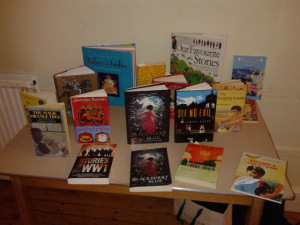 A selection of the works of Jamila Gavin
A selection of the works of Jamila Gavin
To celebrate the first ���birthday��� of the Cotswold Word Centre ��� the platform for language, literacy and literature based at Hawkwood College of which I am the volunteer co-ordinator ��� on World Book Day, we hosted a talk by our patron, Stroud-based writer Jamila Gavin. Jamila was born to a mixed-raced parentage* ��� an English mother and Indian father, who met as teachers in Iran ��� raised mainly in India until eleven when her family moved to England for good ��� and this ���hybrid��� status has informed everything she has written, making her an important champion for multi-culturalism. Weened on a trunk of her mother���s English classics, which accompanied them on their many travels, Jamila initially trained as a pianist, but was a gifted letter-writer. Her childhood years were spent hopping from country to country, capital to capital ��� Paris, Berlin���
View original 505 more words

February 25, 2015
Lupus Cromwellius
The TV adaptation of Hilary Mantel’s Wolf Hall & Bring up the Bodies has just finished and what perfection it was – ‘event TV’ that deserves to win lots of gongs. Period drama is something the Beeb does better than anyone. It was so refreshing to watch a show that wasn’t dumbing down – the acting was sublimely subtle (Rylance’s Cromwell was a masterclass in nuance and understatement), the direction, the script (paring down Mantel’s immense, linguistically-pyrotechnical works), the costumes, the lighting, the music … This is Civilization – what we must fight the Barbarians to preserve. A ray of light in a darkened world. What can be achieved with creative freedom and sufficient funding. All from the mind of a supremely talented woman.
Here are my reviews of the first book….
Wolf Hall – a review
An unforgettable masterpiece, Wolf Hall is an instant literary classic that is riveting from beginning to end. Hilary Mantel is at the height of her powers here, creating a fully realised Tudor England that is dark, damp, deadly and deceitful. In Thomas Cromwell she has forged a true diamond in the dustheap, a flawed multi-faceted protagonist who we can feel compassion for while being in awe of his steely intellect, insatiable ambition, and ice-cold heart, doused in the brutality and tragedy of life. He raises the over-used adjective ‘Machiavellian’ to a whole new art form ��� as though The Prince was written for him. Cardinal Wolsey, Thomas More, Henry VIII, Anne Boleyn ��� all are brought to life, vividly, memorably, in all their vainglorious failings. The broken structure and use of present tense is bold, giving it a contemporary edge (although many of the themes have a topical resonance also – especially the financial gerrymandering); and the highly polished prose is exquisitely poetic at times, while never failing to serve the narrative. Each sentence is tart with razor-sharp wit and a Scorpion-like sting. Each arresting metaphor metamorphoses into the next sentence ��� a linguistic conjurer’s trick that is never merely for show. Mantel makes the language work harder, but the prose never feels tortured ��� it flows like a fine vintage wine. This is a heady, dangerous pleasure that any connoisseur of narrative will delight in ��� leaving you ravenous for more.

February 19, 2015
Dark Sister – a review
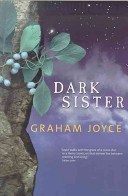 This is a contemporary fantasy set in Joyce’s native Leicestershire ��� an East Midlands he has mythologized without losing any of its prosaicness. And it is this context of down-to-earth realism which anchors the uncanny elements that threaten to overwhelm the lives of the family at its heart. One day, when their chimney is being swept (a folklorically-rich activity) an old diary is found in the chimney breast. This inciting incident turns the world of archaeologist Alex, his wife Maggie and their children Amy and Sam, upside down ��� for the diary is that of a witch called Bella, whose ‘herbal remedies’ piques the curiousity of Maggie. At first she uses them to heal minor ailments, but in her experimentation she pushes the borders of safety, freedom and sanity. As she gets sucked into the supernatural her marriage suffers catastrophically. Meanwhile Alex is engrossed in a dig which unearths evidence of a ritual burial ��� his wife’s burgeoning ‘sixth sense’ locates the find. The couple simultaneously dig down into the dark stuff ��� and the book is very much about acknowledging the Shadow. Demons within both of them are unlocked. This psychological aspect is made explicit by the need to consult a Dr De Sang, who first examines Sam (who acts out the dysfunctionality of the marriage) and then Maggie (who starts to show signs of personality disorder/possession). As with many of Joyce’s books, the uncanny is always given a psychological ‘reading’, so we, the reader, can decide which paradigm to opt for. This creates a tension lacking in many fantasy novels where the incredible is a ‘given’. Joyce’s characterisation and dialogue is utterly convincing ��� well-observed, nuanced, complex. He makes his protagonists feel real and so we care for them. These are not superhero cut-outs. There is a deep humanity in his work, one that is life-affirming and celebratory of the daily miracles of existence. It gives voice to the fragility of our lives ��� how easily they are disrupted, are destroyed. As the ‘dark sister’ of the title invades first Maggie’s mind and the hearth the family unit is caught in a hex of buried hurt, a centuries old grievance narrative left to fester beneath the city centre until brought to light* both in the discovered diary and the dig. Maggie’s frustrated career becomes emblematic of the stifled voices of generations of women ��� controlled or silenced by fearful men ��� and yet it is the women who, as in many of Joyce’s books, provide the powerhouse of the narrative: Maggie; Bella; Liz, an old wise woman; Amy the daughter; ‘A’, a shadowy other controlling Bella; even the anagramic Anita (mistress) and Tania (archaeology student/’babysitter’). The male characters (Alex, De Sang, Sam, and Ash) are, with the exception of Ash, the owner of an occult shop, less appealing, less sympathetic. Both Alex and De Sang stand in the ‘rationalist’, scientific camp ��� facing the mysterious, depthless realm of the feminine with their ineffectual tools. A renegotiation between the genders needs to occur, addressing ancient inequalities ��� like an intercenine conflict destroying a country, Alex and Maggie’s ‘civil war’ is destroying their home and family. The power of the female must be acknowledged, but also the power of the unknown, the other. Reality is not ruled by what is on the surface.
This is a contemporary fantasy set in Joyce’s native Leicestershire ��� an East Midlands he has mythologized without losing any of its prosaicness. And it is this context of down-to-earth realism which anchors the uncanny elements that threaten to overwhelm the lives of the family at its heart. One day, when their chimney is being swept (a folklorically-rich activity) an old diary is found in the chimney breast. This inciting incident turns the world of archaeologist Alex, his wife Maggie and their children Amy and Sam, upside down ��� for the diary is that of a witch called Bella, whose ‘herbal remedies’ piques the curiousity of Maggie. At first she uses them to heal minor ailments, but in her experimentation she pushes the borders of safety, freedom and sanity. As she gets sucked into the supernatural her marriage suffers catastrophically. Meanwhile Alex is engrossed in a dig which unearths evidence of a ritual burial ��� his wife’s burgeoning ‘sixth sense’ locates the find. The couple simultaneously dig down into the dark stuff ��� and the book is very much about acknowledging the Shadow. Demons within both of them are unlocked. This psychological aspect is made explicit by the need to consult a Dr De Sang, who first examines Sam (who acts out the dysfunctionality of the marriage) and then Maggie (who starts to show signs of personality disorder/possession). As with many of Joyce’s books, the uncanny is always given a psychological ‘reading’, so we, the reader, can decide which paradigm to opt for. This creates a tension lacking in many fantasy novels where the incredible is a ‘given’. Joyce’s characterisation and dialogue is utterly convincing ��� well-observed, nuanced, complex. He makes his protagonists feel real and so we care for them. These are not superhero cut-outs. There is a deep humanity in his work, one that is life-affirming and celebratory of the daily miracles of existence. It gives voice to the fragility of our lives ��� how easily they are disrupted, are destroyed. As the ‘dark sister’ of the title invades first Maggie’s mind and the hearth the family unit is caught in a hex of buried hurt, a centuries old grievance narrative left to fester beneath the city centre until brought to light* both in the discovered diary and the dig. Maggie’s frustrated career becomes emblematic of the stifled voices of generations of women ��� controlled or silenced by fearful men ��� and yet it is the women who, as in many of Joyce’s books, provide the powerhouse of the narrative: Maggie; Bella; Liz, an old wise woman; Amy the daughter; ‘A’, a shadowy other controlling Bella; even the anagramic Anita (mistress) and Tania (archaeology student/’babysitter’). The male characters (Alex, De Sang, Sam, and Ash) are, with the exception of Ash, the owner of an occult shop, less appealing, less sympathetic. Both Alex and De Sang stand in the ‘rationalist’, scientific camp ��� facing the mysterious, depthless realm of the feminine with their ineffectual tools. A renegotiation between the genders needs to occur, addressing ancient inequalities ��� like an intercenine conflict destroying a country, Alex and Maggie’s ‘civil war’ is destroying their home and family. The power of the female must be acknowledged, but also the power of the unknown, the other. Reality is not ruled by what is on the surface.
The use of the diary is of particular interest ��� as Maggie reads it more is revealed, as though the act of reading is in itself a magical act. It is interwoven with the narrative. At first only obscure lists of herbs and coded inscriptions can be deciphered, but slowly a voice emerges. The past is translated. This embedded book of magic acts as an agent of change within the narrative ��� disruptive and disturbing, reminding us that words have power and consequences.
As with all of Joyce’s oeuvre, Dark Sister is effortlessly readable and utterly gripping. You know you are in the hands of a warlock of words, one who casts a spell which you do not want to break. The catharsis that comes with this walk on the wild side is powerful and lingering for both the protagonists and reader. Literary flying ointment, this novel is one visceral ride from start to finish.
Kevan Manwaring
20 February 2015
*It’s amazing what you can discover beneath a city centre. This feels like a timely book to read in the year of Richard the Third’s burial – the ‘king under the car-park’, another maligned, ‘shadow’ figure brought out into the light.��

January 30, 2015
If Your Memory Serves You Well…
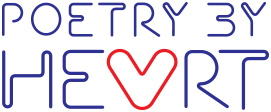
 MC Kevan Manwaring and Joy-Amy Wigman, poet and workshop leader at Poetry by Heart Gloucestershire Finals, 29 Jan 2015
MC Kevan Manwaring and Joy-Amy Wigman, poet and workshop leader at Poetry by Heart Gloucestershire Finals, 29 Jan 2015Last night I had the pleasure and privilege of MCing the Gloucestershire finals of the Poetry by Heart competition. This is a national initiative set up by former Poet Laureate Andrew Motion. It is a poetry recital competition for 14-18 year olds. The contestants must choose 2 poems from the fat anthology containing a timeline of verse from Beowulf to 21st Century poetry: a pre-1914 and post-1914. And this year they were asked to select a third poem, from a First World War anthology. With these three poems committed to memory they must first compete within their schools, in front of class mates; and then the school winners must compete with their county. The winners of these heats get to go to Cambridge in March to perform in the regional and national finals.
The learning of poetry by heart is a great way to build confidence and self-esteem, improve public speaking skills, and foster a deeper understanding of language – transferable skills that can help in many ways; and the poems can become wise friends for the reciter – guiding through life. And you’re never short of a party-piece!
The essence of the contest is very bardic and similar to the Eisteddfod system of which I am very familiar – having entered, won and judged several Bardic Chair contests (the latest being the Bard of Hawkwood which I set up last year). Any initiative that encourages the Bardic Tradition is good by me and this is a particularly well thought out one.
To warm the audience up I offered my comic poem, ‘Phone Tree’, and later on, a couple of my favourite poems, ‘A Musical Instrument’ by Elizabeth Barrett-Browning, and ‘The Song of Wandering Aengus’ by WB Yeats.
I was relieved not to be judging last night – always a tricky thing to undertake, especially when the quality is so high. And it certainly was in the Gloucester Guildhall. The five contestants (all girls, sadly, as the only boy dropped out at the last minute – but well done to the girls for being so brave!) were all of a very high standard. I was deeply impressed by all of them – bringing alive some of my favourite poetry (Kubla Khan; Dover Beach; Lights Out; Journey of the Magi).
There were three judges – all experienced in poetry and drama. We had a guest poem from artist-scientist, the Purple Poet; and a set from Joy-Amy Wigman, the ‘red haired pixie of doom’, who entertained the audience whilst the judges deliberated.
The Guildhall is a great venue – a classy old building which is now an arts centre, with cinema, bar, hall and workshop rooms. It looked like alot was going on.
The judges returned and the winner was announced – Sophia Smout – who will go onto Cambridge. Prizes were handed out – and all those who took part achieved alot by just stepping up the mark. They deserve our respect. As do their parents and teachers for supporting them.
Tim Shortis, from Poetry by Heart, said after that I ‘…did a great job as MC, soothing and encouraging and generally wafting people towards the light.’
I’m a good wafter!
Whatever age you are – it is always worth learning a poem: a friend for life.
http://www.poetrybyheart.org.uk/

If My Memory Serves Me Well…

Last night I had the pleasure and privilege of MCing the Gloucestershire finals of the Poetry by Heart competition. This is a national initiative set up by former Poet Laureate Andrew Motion. It is a poetry recital competition for 14-18 year olds. The contestants must choose 2 poems from the fat anthology containing a timeline of verse from Beowulf to 21st Century poetry: a pre-1914 and post-1914. And this year they were asked to select a third poem, from a First World War anthology. With these three poems committed to memory they must first compete within their schools, in front of class mates; and then the school winners must compete with their county. The winners of these heats get to go to Cambridge in March to perform in the regional and national finals.
The learning of poetry by heart is a great way to build confidence and self-esteem, improve public speaking skills, and foster a deeper understanding of language – transferable skills that can help in many ways; and the poems can become wise friends for the reciter – guiding through life. And you’re never short of a party-piece!
The essence of the contest is very bardic and similar to the Eisteddfod system of which I am very familiar – having entered, won and judged several Bardic Chair contests (the latest being the Bard of Hawkwood which I set up last year). Any initiative that encourages the Bardic Tradition is good by me and this is a particularly well thought out one.
I was relieved not to be judging last night – always a tricky thing to undertake, especially when the quality is so high. And it certainly was in the Gloucester Guildhall. The five contestants (all girls, sadly, as the only boy dropped out at the last minute – but well done to the girls for being so brave) were all of a very high standard. I was deeply impressed by all of them – bringing alive some of my favourite poetry (Kubla Khan; Dover Beach; Lights Out; Journey of the Magi).
There were three judges – all experienced in poetry and drama. We had a guest poem from artist-scientist, the Purple Poet; and a set from Joy-Amy Wigman, the ‘red haired pixie of doom’, who entertained the audience whilst the judges deliberated.
The Guildhall is a great venue – a classy old building which is now an arts centre, with cinema, bar, hall and workshop rooms. It looked like alot was going on.
The judges returned and the winner was announced – Sophia Smout – who will go onto Cambridge. Prizes were handed out – and all those who took part achieved alot by just stepping up the mark. They deserve our respect. As do their parents and teachers for supporting them.
Whether you are an adult or a junior – it is always worth learning a poem: a friend for life.
http://www.poetrybyheart.org.uk/

January 18, 2015
A Night at Heorot
In the middle of the night Grendel arrived in bloody fashion, slaughtering sleeping warriors slumbering after the feast. Beowulf confronts the night-lurker and grapples with him hand-to-hand. The Geat rips off one of Grendel’s arms, who flees into the night.

There comes a time when you finally have to knuckle down to it ��� the Great Task. You have summoned the Hero (within) and now you must step up to the mark (or to the desk, unless you are of the Hemingway persuasion, in which case you can stand). This will be your defining moment as a fledgling writer ��� as you really one, or was all that talk just hot air?
Virginia Woolf talked of the importance of a ���room of one���s own���. Wherever or whatever it is ��� be it a boatshed like Dylan Thomas���; a garden office frequented by Philip Pullman; a cork-lined Parisian apartment resided in by Proust; or pottering in an Edinburgh caf�� like JK Rowling, for the time you spend writing there, it is your Heorot. See Hrothgar���s hall as a metaphor for your imagination ��� vast and majestic. This is your special place ��� the place you go inside yourself when you write ��� utterly unique to you: ���the famous mead-hall was finished and done./ To distant nations its name was known,/The Hall of the Hart������174 This ���hall of the heart��� is a precious place and deserves protecting ��� like Beowulf, Hrothgar���s retainer, guard it jealously.
And yet, be prepared to go through Hell while you���re there. You will face your demons. You will gnash your teeth and tear out your hair. You will sweat, bleed, and weep.
Writing is a lonely business. No one else will write that masterpiece for you (unless you pay a ghost writer, in which case ��� get out of here, you���re a celebrity). Doris Lessing wisely said: ���Literature comes from a man or woman sitting alone in a room with a phone off the hook, probably a cup of coffee, and in the good old days, a cigarette.��� Don���t make excuses, make it happen. Steinbeck wrote: ���This is the writing job, the loneliest work in the world. If I fail there is only one person in the world to blame…���
Although we should be wary of ���spontaneous house-work��� (the compulsive sharpening of pencils, obsessive desk tidying, and other random displacement activities) there is something to be said for an orderly writing space. I love the description of Blake���s room, from a letter of Samuel Palmer���s (1860): ���his rooms, were clean and orderly; everything was in its place. His delightful working corner had its implements ready ��� tempting to the hand. The millionaire���s upholsterer can furnish no enrichments like those of Blake���s enchanted rooms.��� Your study, if you are lucky enough to have one, is your Heorot. Yet imagination is the ultimate upholsterer ��� with it we can re-enchant the mundane. And so, we do not need a fancy ���garden office��� with perfect views, however enticing that would be. All we need is a knee and a notepad. With our imagination, we are free ��� wherever we are, as Shakespeare so eloquently put: ���O God, I could be bounded in a nutshell, and count myself a king of infinite space …���175 The chilling caveat here is ���…were it not that I have bad dreams������ but as writer���s we can turn those ���bad dreams��� into prose, poetry, and plays.
Like Beowulf, you are going to give Grendel ��� a bad dream incarnate ��� a run for his money. Hero and antagonist finally clash in a spectacular melee, and in that conflict (between Higher and Lower Self; between our dreams and our nightmares; our fears and desires) the most exciting, muscular writing is created ��� sentences with frisson fly off the page. However difficult circumstances can be (and writers over the centuries have endured the worst) from such creative tension the best work can be produced. A place of safety, of comfortable happiness, of artistic complacency, can produce bland results. Writing from our comfort zones, we have artistically ���snoozed off on the couch���. We have regurgitated TV dinners and soap operas. But if you are prepared to take risks and make yourself vulnerable ��� as Beowulf does, stripped down, armour-less and weaponless ��� then something good might result. Writing with an edge. It is terrifying, grappling with our demons in the night ��� but if you can hold your nerve you can produce something of true worth.
This is what I call the ���unflinching gaze���. If you can stay with that which you find most challenging, most unbearable ��� you will produce writing of real authenticity and power. You will find the voice in the shadows. It takes a warrior���s heart to endure this:
���A terror fell on the Danish folk
As they heard through the wall the horrible wailing,
The groans of Grendel, the foe of God
Howling his hideous hymn of pain,
The hell-thane shrieking in sore defeat.���176
Withstand this and you will be a true hero. Burn the midnight oil ��� metaphorically, or literally. Stay with it. Wrestle this beast into submission ��� and when you finally come up for air, perhaps returning to it the next day with a cup of coffee, a bit wiped out, you���ll be unspeakably satisfied, as was Beowulf: ���he was happy with his nightwork/ and the courage he had shown.��� Somehow, against all odds, you have managed to wrench this ���dirty first draft��� ��� like Beowulf ripping off Grendel���s arm. It���s not the whole beast, but it���s one helluva start:
This bloody stump is your first draft, plucked from the abyss. It is raw and dripping ��� ugly to all except its creator ��� but you have rendered it with your own hands. Your night in Heorot has produced results. You have showed what you are made of. Perhaps you are a writer after all (many fail this first test of courage). As Hrothgar had said in his parting saw:
���Be mindful of glory, show forth your strength,
Keep watch against foe! No wish of your heart
Shall go unfulfilled if you live through the fight.���177
Writing can redeem the worst experiences and celebrate the best. It is essential we face our demons in the dark, share our hard-won wisdoms, and sing our journey���s song. The personal is powerful. Go where the pain is ��� that���s where the power is. In the next installment we���ll examine this bloody stump in more detail.
Extract from Desiring Dragons: creativity, imagination and the writer’s quest
by Kevan Manwaring, Compass Books, 2014


